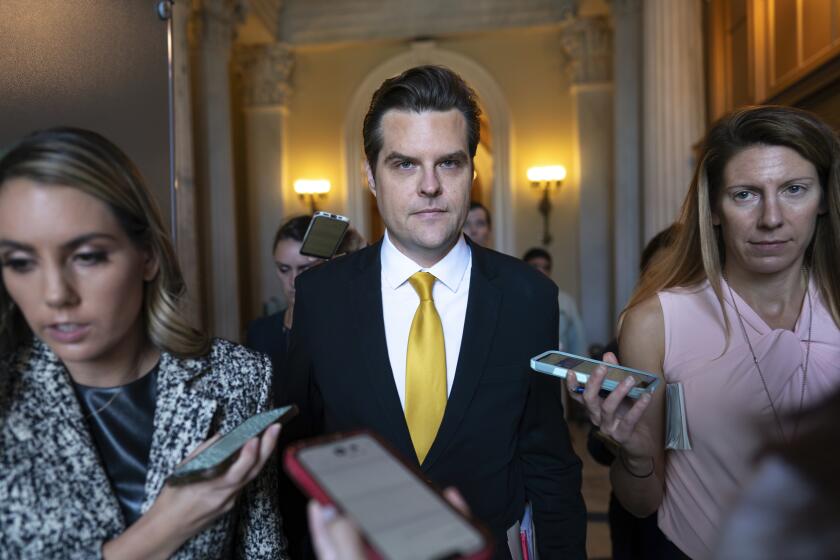McManus: Fiscal crisis? What crisis?
Hereâs what is most maddening about the âPerils of Paulineâ fiscal crises that President Obama and Congress have led us into during the last year: Both sides have known from the beginning what the final deals would look like, but neither side has been willing to budge before it had to.
Take the current dust-up over sequestration. If you listen closely to Obama and leading members of both parties in the Senate, youâll find that theyâve already reached a rough consensus about how to shrink the federal deficit in a smarter way. Theyâll cut the same amount, but theyâll spread it around differently and perhaps delay some of the cuts. Then they will make changes in âentitlementsâ (Medicare, Medicaid and Social Security) to reduce their future cost. And they will enact tax reform to raise federal revenues, not by raising tax rates but by making more income taxable at existing rates.
There will be plenty of wrangling over the details, of course. But a bipartisan majority already agrees on these basic elements, and theyâre the same ones that were on the table when Obama and House Speaker John A. Boehner tried â and failed â to negotiate a grand budget bargain in 2011.
So why canât they stop dithering and do what needs to be done? Two reasons.
First, any long-term solution requires each side to swallow something they find unpalatable. Democrats hate the idea of cutting government spending while the economy is still struggling, And they certainly donât relish cutting Medicare, Medicaid and Social Security. Republicans, for their part, donât want to raise taxes if they can avoid it; thatâs the core principle that ties their fraying party together.
And that leads to the second reason we donât have a deal: The two sides donât trust each other. The failure of the Obama-Boehner talks in 2011 left a lot of bitterness on both sides. Republicans insist Obama made a handshake deal on taxes, then tried to change the terms. Democrats counter that Boehner walked away when he realized his own party would never embrace the tax hikes he had agreed to. âBoehner couldnât deliver a pizza,â a White House aide complained later.
Still, the two sides will eventually make a deal, because they know they have to. Obama and his aides have reaffirmed over the last two weeks that heâll agree to buck his liberal base and embrace cuts in future entitlement spending.
And even as Boehner, prodded by conservative House members, seems to be digging in his heels about raising revenue, there are signs that his party will ultimately come around.
Already, some Republicans are sounding more flexible. Sens. John McCain, Lindsey Graham, Tom Coburn and Kelly Ayotte have all said they would agree to increased revenues if they were used to reduce the federal debt. âWe need to raise taxes to get our government out of debt,â Graham said on CBSâ âFace the Nationâ on Sunday.
So far, though, the only Republicans who seem ready to buck their partyâs anti-tax orthodoxy are members of the Senate, not the House.
There are several reasons for that. The Senate isnât really any less polarized than the House, but senators run statewide, which means they often need to appeal to voters in the center of the electorate in a general election. Many House members, on the other hand, donât need to court the middle because they represent smaller, more homogenous and partisan districts.
Moreover, noted former GOP Rep. Mickey Edwards, maverick senators donât face the kind of discipline from their party leadership that independent-minded House members do. âIn the House, the leadership can punish you â by denying good committee assignments, for example,â Edwards said. In the much smaller Senate, by contrast, the leadership needs every vote and canât afford to treat mavericks too badly.
So where does this leave us on overcoming the impasse?
Thereâs widespread agreement that we have to cut spending, but the cuts need to be smarter than those in the sequester. So hereâs an idea: Instead of occasional furlough days for government workers, letâs furlough the entire House of Representatives. In the interest of bipartisanship, weâll furlough the president too. (Heâs already said heâs taking a break from budget politics for a while, so itâs no big imposition.)
Then maybe the Senate can get down to the business of passing a deficit-cutting deal. If they hurry, they might even get it done before the next fiscal crisis.
Follow Doyle McManus on Twitter @DoyleMcManus
More to Read
A cure for the common opinion
Get thought-provoking perspectives with our weekly newsletter.
You may occasionally receive promotional content from the Los Angeles Times.











